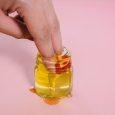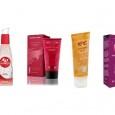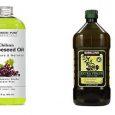Many of us have been there: you invite someone over, things get hot and steamy, you reach out for your favorite lube to get things going — and discover that the jar is empty.
What do you do?
Well, like many people, this dilemma might take you on a journey around your home to find a suitable replacement for your now-empty jar of lube. One of the things you might see is a bottle of baby oil. And it might make you think: “Can I use baby oil as lubricant?”
Disclaimer: condom-sizes.org is supported by its readers. When you buy through links on our site, we may earn an affiliate commission. Learn more.
What’s in Your Baby Oil?
Before anything else, let’s take a look at what baby oil is made of. Many commercially available versions contain two ingredients: mineral oil and fragrance. Mineral oil is a byproduct of crude oil refinement, and it’s a controversial substance, as some people believe that it has harmful effects.
According to these folks, it can clog pores, interfere with the release of toxins through the skin, and prevent the skin from absorbing any nutrients you apply on it. There are even those who believe that mineral oil can cause cancer!
However, many people insist that mineral oil is safe to use. It’s regulated by the FDA, and companies supplying it must make sure it’s properly refined and purified before the oil can be sold on the market. According to these people, the fact that mineral oil is used in a product for babies means it’s safe for adults to use.
Lubing with Baby Oil: The Pros and Cons
Assuming that baby oil is safe for skin, we have to look at another aspect: using it as a personal lubricant. This comes with both pros and cons, and we discuss them below:
PROS
- It feels good — This is one of the biggest reasons why people love to use baby oil as lube. Since it’s thicker than water-based lubricants, it glides more smoothly and makes sex — particularly anal sex — more pleasant and enjoyable.
- It lasts long — Unlike water-based lubes, which dry out quickly, baby oil lasts for hours. A little goes a long way, and there’s no need to reapply every now and then.
- It’s cheap — You can get a decent-sized bottle of baby oil for less than $5. And since it’s long-lasting, you can make the bottle last for weeks or even months.
- It’s easily available — If you already have baby oil in your room or house, there’s no need to go out and buy lube.
- It’s multipurpose — Aside from using it as a personal lubricant, you can use it to moisturize your skin and hair.
CONS
- It can break down latex — When exposed to mineral oil, latex condoms lose up to 90 percent of their strength. This increases the risk of pregnancy as well as the transfer of sexually transmitted diseases (STDs).
- It doesn’t easily wash off — If you’re not careful, baby oil can stain your sheets, clothes, and underwear. Even worse: you can’t remove it from your body with a simple shower since it doesn’t easily react to soap and water. This can leave you feeling “greasy” a few hours or even days after your sexual encounter.
- It can cause vaginal infections — Since baby oil isn’t easy to clean and wash off, it has the tendency to stay in the vagina or anus for several days. This, coupled with the fact that it promotes bacterial growth, means that those who like to use baby oil are more prone to infections in the genital and rectal area.
Baby Oil for Oral Sex
If you love to use lubricant during oral sex, baby oil is not the right choice for you. For one thing, it’s not really palatable, so it can interfere with your enjoyment since you most likely won’t like how it tastes. Aside from this, it’s not recommended to ingest baby oil in large quantities.
Since you’ll most likely swallow some of the lube you use during oral sex, there’s a high chance that you’ll swallow baby oil when you make it your lubricant of choice. This can be harmful to your health in the long run.
Baby Oil for Vaginal Sex
As mentioned above, baby oil can weaken latex condoms as well as polyisoprene ones. When this happens, it essentially renders your condom useless and increases your chances of getting your partner pregnant. It also exposes you to higher risks of contracting STDs.
Aside from providing a good environment for bacteria to grow, baby oil can change pH levels and other factors in the vagina and make it more prone to developing infections. This makes women more prone to getting yeast infections and bacterial vaginosis, both of which can lead to more serious conditions like pelvic inflammatory disease.
Using Baby Oil for Anal Sex
Baby oil is the lube of choice for many couples who love anal sex or are experimenting with it. This isn’t really surprising since baby oil creates a slick, smooth environment that makes anal sex less painful and more enjoyable.
However, just like with vaginal sex, the oil can make condoms break and render barrier protection useless — making the transfer of STDs more possible than ever. It can also be harmful for the recipient of anal sex.
Since baby oil can’t be easily washed out, it can stay in the anal region and create an environment that encourages bacteria to thrive. This, in turn, raises the risk of infections.
Baby Oil and Masturbation
Because of the health risks that comes with it, baby oil is usually not recommended as a masturbation lube for women. However, many men find that masturbating with baby oil is a pleasurable experience since it creates a smooth sensation.
It’s important to note, though, that it shouldn’t be paired with male masturbators that are made of latex. Baby oil may also clog the pores on your penis and cause acne-like bumps to develop, so use it at your own risk.
Final Thoughts
In short: baby oil is not advisable for oral, vaginal, and anal sex. It’s more advisable to use commercially sold personal lubricants that are either water-based or silicone-based since these are designed to provide lubrication without harming your health.





